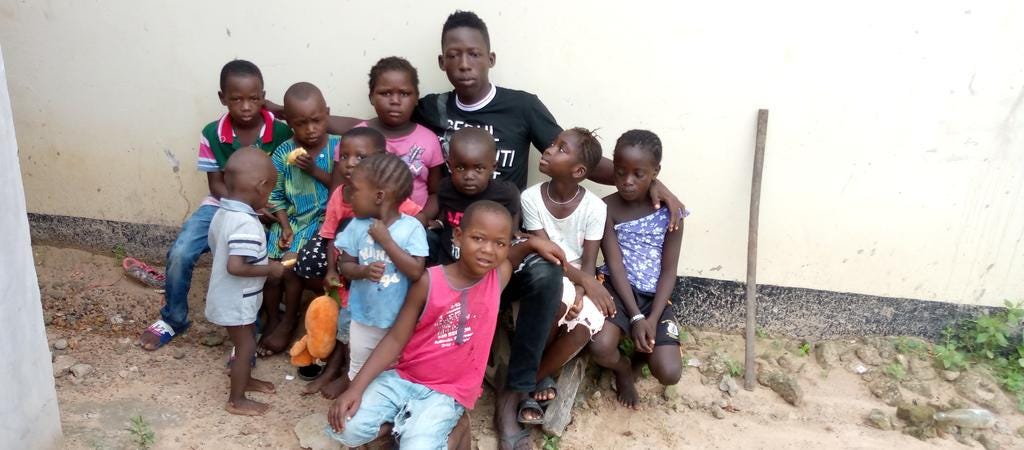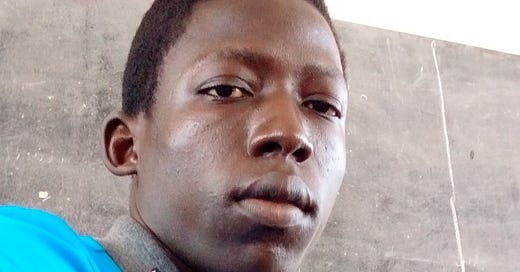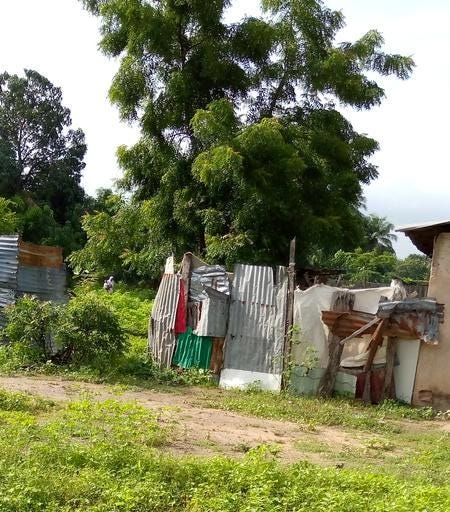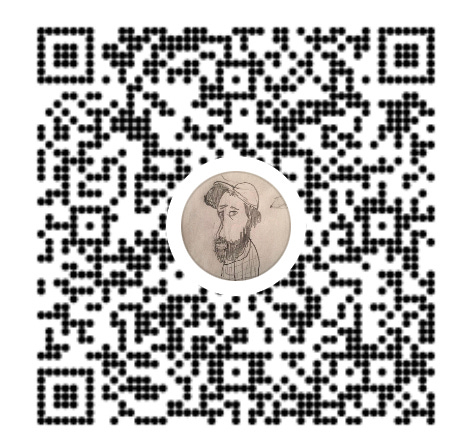Patrick introduced himself to me on Twitter thus, “Hello, how are you doing? Nice to meet you, I'm from The Gambia, West Africa.”
Klaxons. Ordinarily an unsolicited message from a West African sets off alarm bells like a flock of starlings taking off. We’re trained as Americans to anticipate the pigeon drop, and Africa is a flag of such crimson surety that we actually call the scheme the Nigerian prince scam. Imagine that: a continent of over a billion people comprising fifty-four nations boiled down to a con we probably first saw in The Sting.
He went on, “I like making friends all over and learning new things, cultures everyday. Like it is said, living a day without learning doesn't worth living, how is the weather there?”
If this is a con it’s obviously going to be a long one and anyway I’m already hooked—Twitter is ordinarily a place to insult strangers; being asked about the weather feels like a stranger handing you a puppy.
Speaking of which: “I love animals too. It is interesting to study and watch their behaviors and interactions. I hope life is better where you in this challenging moment? I will be happy to hear from you soon.”
Defenses gone.
We chatted amiably for a couple weeks, and I learned a lot about a very different world. The Gambia is the smallest African nation, a long, narrow strip straddling the Gambia River and completely surrounded by Senegal except for its small Atlantic coast. Patrick lives in a tiny village called Penyem, about four miles south of Brikama—itself a city a bit smaller than Murfreesboro, Tennessee, where I attended college. Penyem can’t consist of more than a few hundred people. There’s no electricity, the roads are unpaved, there are no shops and no market. Patrick’s “granny”1 walks half an hour to a market town to buy the fish, rice, and beans that are the staples of their diet:
“Granny goes to Busura there is another village where they sell editable goods so she take a walk there today. Here we have small brown beans sometimes granny pound it and cook Accra made with stew and we eat it for dinner.”
Life is difficult in The Gambia for most people; 75% of the economy is subsistence farming, so there isn’t much left for cash crops or industry of any sort. For Patrick it’s an order of magnitude harder. His mother died giving birth to his twin sisters, and his father and elder brother drowned trying to reach Italy when the ferry they were on capsized in the Mediterranean. This left the family of six with an underpowered engine—Patrick and his granny. And then Covid came.

The pandemic shut down the whole country right at the moment that Patrick was attempting to qualify for admission into the University of Gambia. Unable to attend online classes and struggling to scrounge enough food for his family (even hunting was temporarily banned nationwide), he failed to acquire the O-level credits necessary to become a student there. Now he volunteers at Penyem’s elementary school, teaching English and math to sixth-graders. On weekends he hunts for rabbits and antelope to help feed his siblings. (He also contributes part of his kills to his neighbors.) He has sufficient academic achievement to apply to Gambia College, which would allow him to pursue teaching as a career, but his lack of Internet connectivity and electricity represent seemingly insurmountable barriers, and at the moment his life has largely ground to a halt in an environment where you have to move to stay alive.
The elementary school doesn’t pay, but it does give him one gift—an hour or so of Internet access at the end of each day. He chose to use it befriending random people on Twitter, where chance brought him to me.
We’ve talked about everything: food, work, the history of our respective countries. His English is far from perfect but he answers every question I put to him at length, and he’s always interested to hear about my doings. This makes for some awkward conversations, to be honest. He recently sent some photos of his village. One depicted his family’s bathroom—a jumble of corrugated tin behind the cinder block house where they live. So when Patrick asks what I’m doing over the weekend, I don’t feel comfortable telling him, “putting up new drywall in our upstairs bathroom.”
I should point out that Patrick never asked for help with college. I became interested in his plight as I learned more about his country and began to realize that his problems, while daunting, are perhaps soluble. Living in the United States we get used to issues at a certain level—like how will I afford a new $800 washing machine. It’s an eye-opener to discover that in The Gambia a loaf of bread costs about five cents. For Patrick such matters are literally life and death, but for me I can’t help but feel a certain perverse joy that I can do so much good with the sort of money I fritter away in the couch cushions.
And so we arrive at the proposal. After much discussion I realized that what Patrick really needs to continue his education is a laptop. Not an expensive one: a Chromebook will do. He’s saving to gather enough money for a second-hand bicycle, with which he can more easily get to Brikama, where Gambia College is located. He can charge the laptop there and attend classes, then return home to look after his family and do his school work.
We can get him the laptop.
We need a mere pittance to get him a machine suitable for writing papers and whatnot; I’ve selected a Samsung Galaxy Chromebook 4, which purportedly has a twelve-hour battery life and is built to military grade durability specifications and so ought to be well-suited to the dusty, hot, daily commute to Brikama. It’s only two hundred bucks; if just twenty of you fine readers chip in ten bucks each we’re there. I’ll kick in double whatever the average winds up being, and if we go past the amount needed I’ll use the rest to assemble a care package of good food for Patrick and his family. And of course, I’ll document his travails and hopefully his victories here.
Venmo seems the appropriate choice here; fees are minimal and transactions are all public. Send your donation to @Fletcher-Moore-3. If you’re not a Venmo person feel free to Paypal me at fletcher@superflet.ch and I’ll include your contribution in a separate public accounting.
“What of people that don’t have what I have? Are they victims of my leisure?” So asked the late, great D. Boon. It’s a question that rattles around in my head from time to time but it’s still perfectly possible to eat popcorn while asking it. The lives of millions, to borrow an expression from Joseph Stalin, are statistics. Here’s a chance to make a big impact on the life of one resourceful, tough kid who just needs a break. He’s my friend, Patrick. Let’s give him one.2
Patrick habitually refers to her as his granny and I find the term endearing.
I have opted to forgo the latest Star Trek review in order to avoid distracting from what is to me a signally important subject. Never fear, you’ll get a double shot next time.






❤️Somehow missed this…Glad to contribute!